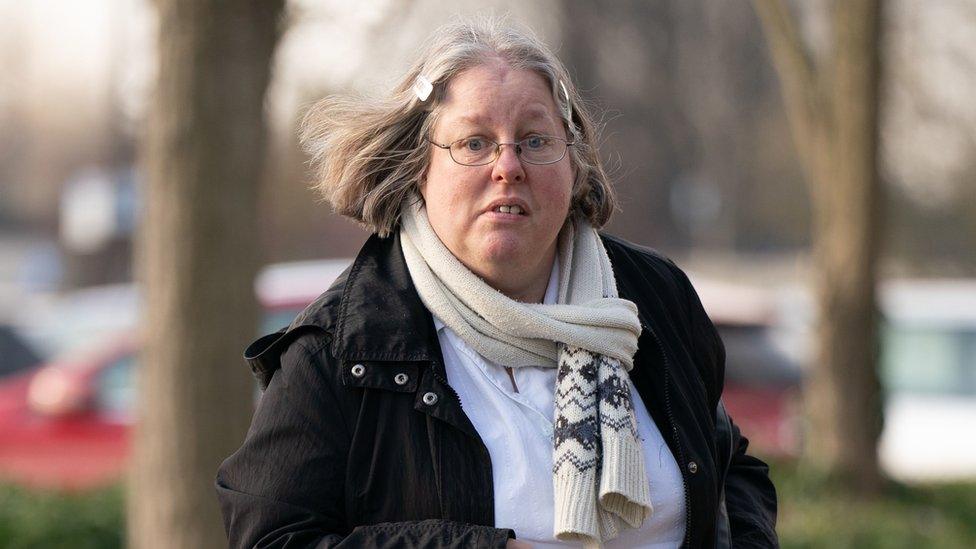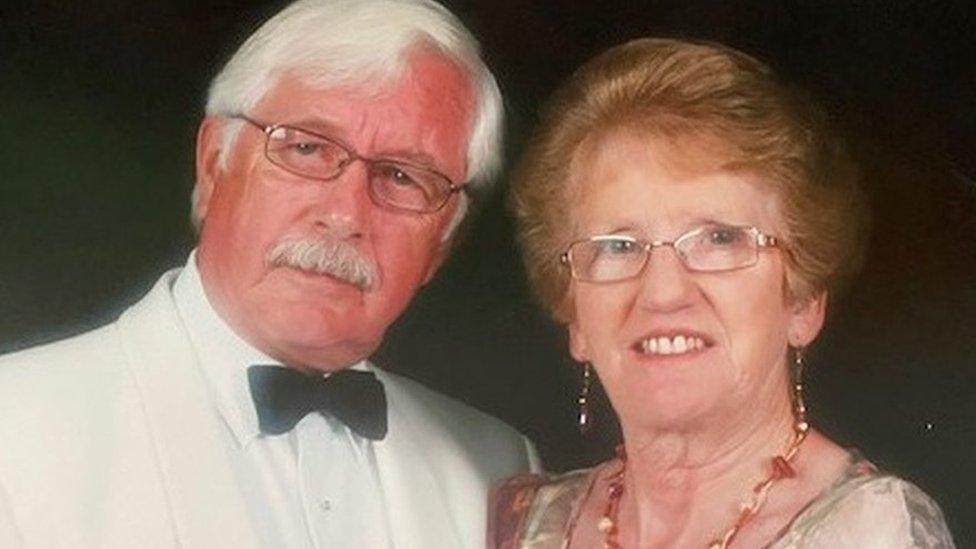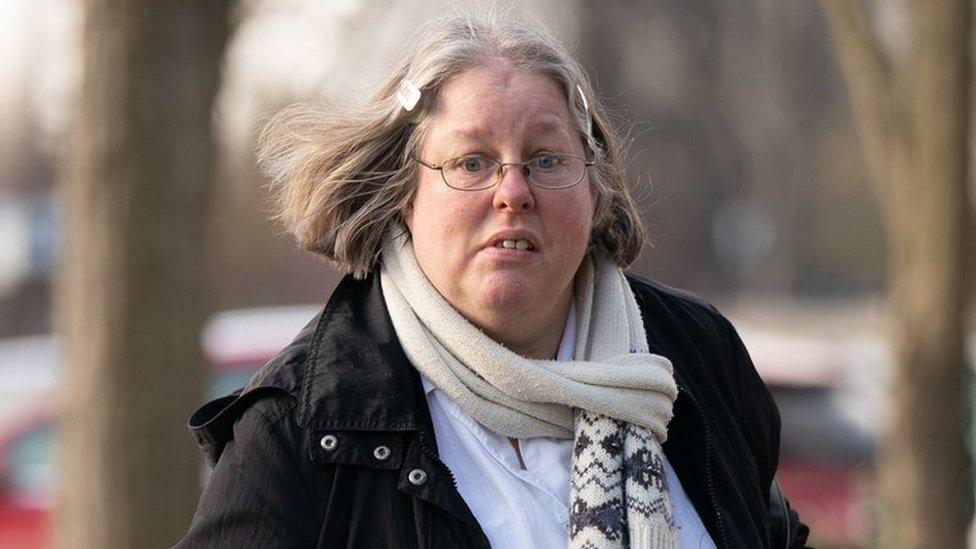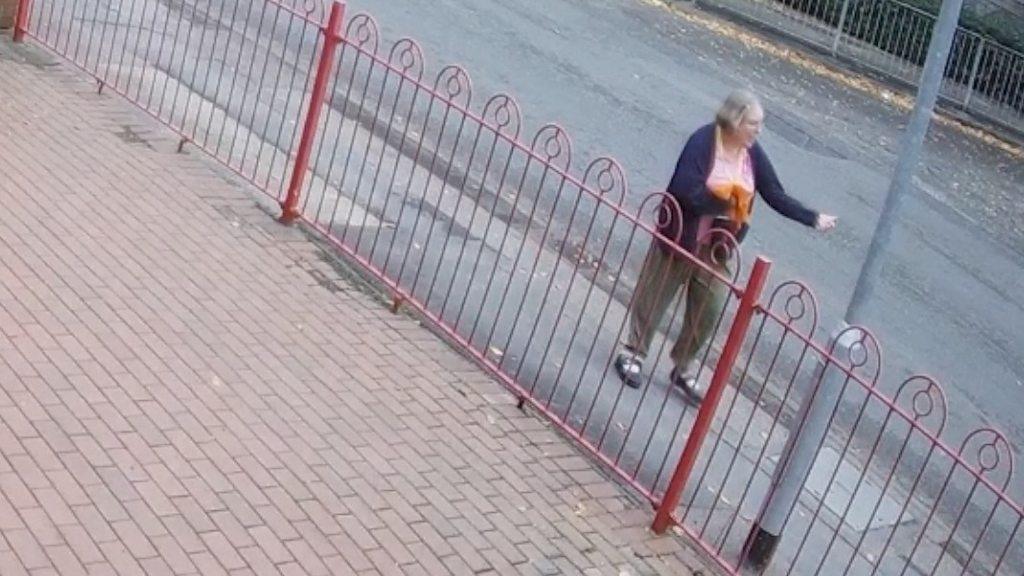Auriol Grey: Huntingdon cyclist killer fails in appeal bid
- Published

Auriol Grey, who confronted the cyclist in the Cambridgeshire town, was convicted of manslaughter after a retrial
A pedestrian whose actions killed a 77-year-old cyclist when she was angered by her being on the pavement has failed in an appeal against her sentence.
Auriol Grey, 49, shouted an expletive and gestured in an "aggressive way" towards Celia Ward, who fell into the path of a car in Huntingdon in 2020.
In March, Grey, of Bradbury Place, was jailed for three years after being convicted of manslaughter.
Court of Appeal judges dismissed her application for leave to appeal.
The two women passed each other in opposite directions on the pavement of the Cambridgeshire town's ring road, during the afternoon of 20 October.
In CCTV footage, Grey could be heard shouting at Mrs Ward, a retired midwife, to "get off the [expletive] pavement".
Appeal judges said Mrs Ward then "collided" with Grey and fell into the road, where she was hit by a car.
Auriol Grey was filmed shouting an expletive at the cyclist in Huntingdon
Her legal team had sought for her sentence to be reduced and suspended.
The Court of Appeal in London heard that, after she was jailed, a psychologist - in a report paid for by Grey's family - diagnosed her with autism.
Miranda Moore KC, representing Grey, who has cerebral palsy and is partially blind, argued that the sentence was "excessive" and the diagnosis may have made a difference in her case.
She had argued the sentencing judge had made findings of fact against evidence, stating it "came as something of a shock" he found the pavement to be a shared cycleway, despite the local council being unable to confirm that.
But Mr Justice Griffiths, sitting with Lord Justice William Davis and Judge Neil Flewitt, refused to grant permission for Grey to appeal against her sentence, concluding it was "not arguably manifestly excessive".

Celia Ward and her husband, David, pictured left, married in 1967
The court heard Mrs Ward's widower said their 50 years of marriage had ended "in the most horrific way".
In an impact statement, the driver of the car that hit Mrs Ward said there was "always a piece of me that feels guilty" and that her whole life had "turned upside down" following the incident.
Mr Justice Griffiths said: "A blameless woman had been killed by the unlawful act of [Grey] with devastating impact upon the family she left behind and upon others including the entirely blameless driver of the car."
He told the court the sentence passed "had to mark the gravity of the unlawful killing" while taking into account mitigating factors.
The sentencing judge Sean Enright had "placed very strong emphasis" on Grey's disabilities, he said.
He added: "We do not consider that the recent psychology report calls for a greater reduction than was already given in this respect by the judge."
Outside of court, Grey's brother-in-law Alisdair Luxmoore expressed their family's condolences to Mrs Ward's family, stating "our actions today must diminish nothing from the suffering that they have had to endure".
But he said they were "very sad" about the failed appeal bid, adding: "We don't believe that prison is the right place for someone in Auriol's circumstances."
Jailed woman shown CCTV of her shouting at cyclist in Huntingdon
After the hearing, Grey's barrister Ms Moore told reporters: "The law of manslaughter needs to change because the perception of risk does not cater for people who are mentally challenged."
The Ministry of Justice has been asked for comment.
Cambridgeshire County Council said following Grey's conviction it might have to review its shared pavements policy, admitting it did not know whether this section was one.

Find BBC News: East of England on Facebook, external, Instagram, external and Twitter, external. If you have a story suggestion email eastofenglandnews@bbc.co.ukor get in touch via WhatsApp on 0800 169 1830
Related topics
- Published10 March 2023

- Published3 March 2023

- Published2 March 2023

- Published24 February 2023

- Published23 February 2023

- Published20 February 2023
